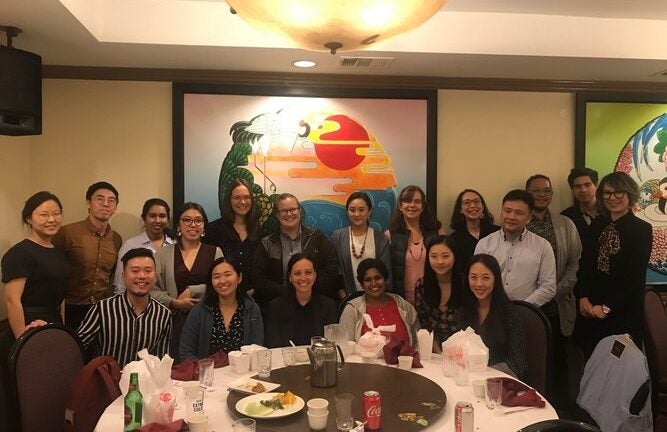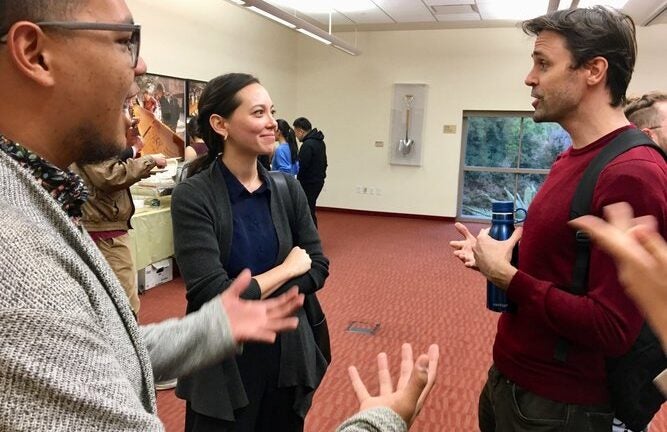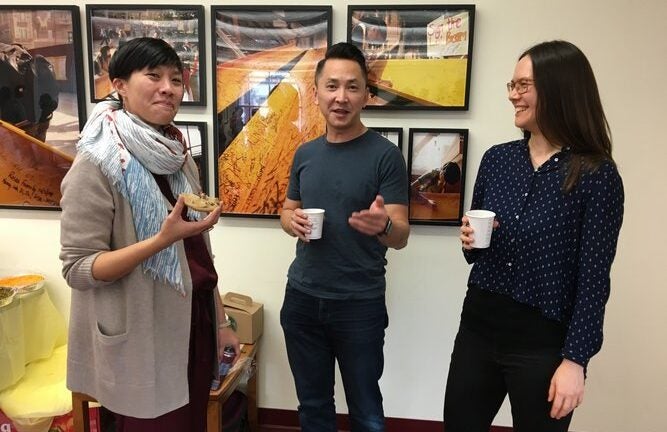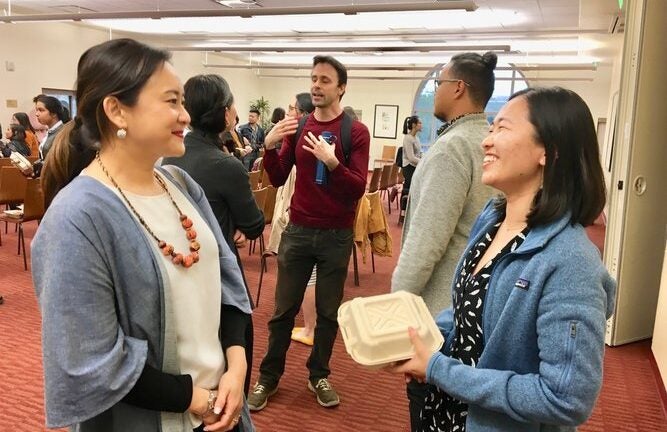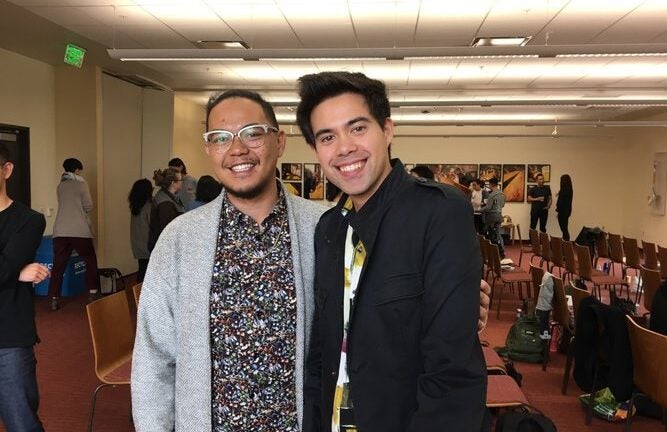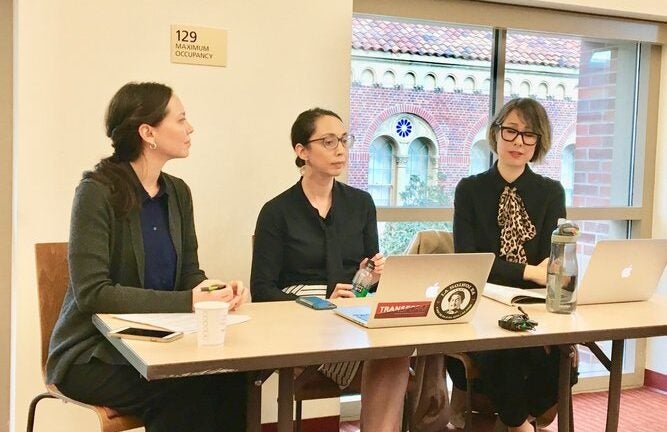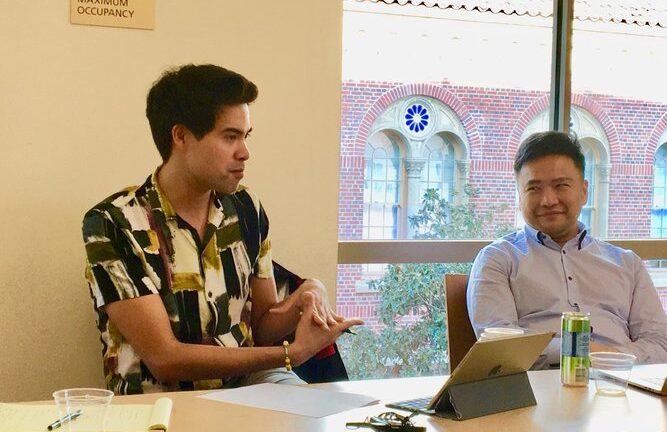
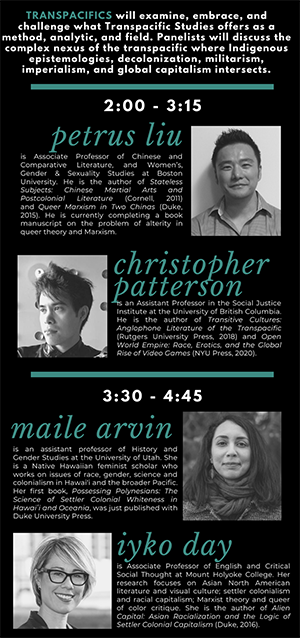 Sponsored by the Center for Transpacific Studies, USC
Sponsored by the Center for Transpacific Studies, USC
Held Saturday Feb 22, 2020 at the Taper Commons Center
9:00 am-12:00 noon Morning Breakout Sessions:
There were four different small workshops, each led by one of the invited scholars, in which four doctoral students shared pre-circulated works-in-progress with each other and with the invited scholar.
They were divided topically into “Media Networks” (led by Christopher Patterson), with Huan He, Darshana Mini, Karlynne Ejercito and Rosanne Sia), “Empire and Militarisms (led by Ikyo Day) with Christopher Chien, Teraya Parametha, and Dillon Sung, “Decolonization and Indigeneity (led by Maile Arvin) with Samantha Ikehara, Heidi Hong, Rebekah Garrison and Kathrine Hammit, and “Gender and Sexuality” (led by Petrus Liu) with Kyunghee Eo, Angela Kim, Proma Chowdhury, and Minwoo Jung
Afternoon Public Program, moderated by Viola Lasmana
2:00 pm-3:30 pm First Session: What is the Transpacific? How does it intersect with Queer Theory?
Christopher Patterson, who is both a scholar of Anglophone novels and a novelist himself, said he wrote about the idea of the Transpacific in his first academic book, Transitive Cultures: Anglophone Literature of the Transpacific (Rutgers University Press, 2018), which examines Southeast Asian diasporic novels focusing on queer migrants, those who resist ethnic stereotypes, and those who feel few ties to their ostensible homelands. His second academic book, Open World Empire: Race, Erotics, and the Global Rise of Video Games (New York University Press, 2020), sees video games as an artistic expression of global empire by playing them erotically and as Asiatic commodities. He said that the term should be used pragmatically, but it is better to leave it “undisciplined”. While he does work on migrants and travelers, he also said bodies do not need to actually move back and forth for there to be cultural exchange. He noted that video games are seen as an “Asiatic product”, but they are now also disseminating ideas of a U.S. led digital empire.
He defined his own theoretical project of looking at “transitive cultures” as a practice of translation and transition, which resists state projects of multiculturalism and tries to define something like a “Transpacific subjectivity”. His novel, Stamped: An Anti-Travel Novel (published under the pen name of Kawika Guillermo) is about marginalized people from the U.S. who live in Asia and realize their own forms of privilege. The main character is a Filipino in Thailand who comes to the realization that he can use his racially ambiguous appearance to cross over certain social and racial barriers: “Your race card has now turned wild”.
Petrus Liu defines himself as a theorist of “queer Marxism”, which is also the title of his second book, Queer Marxism in Two Chinas (Duke 2015), which assembles an archive of literary materials, cultural criticism, and activist strategies to develop a non-liberal alternative to Western models of queer emancipation. His first book, Stateless Subjects: Chinese Martial Arts Literature and Postcolonial History (Cornell 2011), is the first comprehensive study of wuxia film and fiction in the English language. He said “The word queer was born at a conference in Santa Cruz in its modern meaning. So we do need to provincialize queer and see it as an incomplete work in progress that we are all contributing to in some way.”
He sees the key attributes of what he calls “queer studies with a Transpacific eye” as including forms of fluidity and indeterminacy, since queerness can be linked to precarity. He sees gender as an improvisation within societal constraints. His work on martial arts is also from his perspective an analysis of gender dynamics and gender fluidity within the martial arts.
3:30-5:00 Second Session: Indigeneity and Settler Colonialism, moderated by Ashanti Shih
Iyko Day is the author of Alien Capital: Asian Racialization and the Logic of Settler Colonial Capitalism, which retheorizes the history and logic of settler colonialism by examining its intersection with capitalism and the racialization of Asian immigrants to Canada and the United States. Day explores how the historical alignment of Asian bodies and labor with capital’s abstract and negative dimensions became one of settler colonialism’s foundational and defining features. In response to a question about Transpacific Studies, she joked that she was a “dirty hemispheric continentalist”, but then explained that while she does not use the concept specifically in her work, she sees it as useful since it focuses on crossing over borders.
Maile Arivn, the author of Possessing Polynesians: The Science of Settler Colonial Whiteness in Hawaii and Oceania, said that it is important not to use the Transpacific as a synonym for the old idea of the Pacific Rim—-which in fact has often been criticized as reflecting an American sphere of influence and political and economic domination rather than a cultural sphere of interaction. There was consider discussion of the term that should be used to refer to settlers of color—-are they aliens, arrivants, settlers, or some special category of their own? Her own work explores the logic of possession and how it is gendered, especially as a legal term, since when a man married marries a woman he acquires her land and possessions. While Polynesians were seen as almost white (and this distinguished them from Melanesians and Micronesians) this allowed their white husband to absorb both their land and their identity.
Iyko Day asserted that race was deeply related to property relations and to physical attributes:
“Whiteness is a form of property. Orlando Patterson notes that many mixed-race slaves were paler than their masters, but were defined by their hair.”
Comments from doctoral students who participated in the morning workshops:
Indigeneity and Decolonization (comments from Heidi Hong): “We workshopped our papers, which were about the construction of the Subaru Telescope in Mauna Kea and the legacies of Japanese empire in the Pacific, indigenous approaches to species conservation in Craig Santos Perez’s eco-poetry, confronting white colonial deliberate ignorance in decolonial and demilitarization movements in the Pacific, and the circulation of Francophone Polynesian literature in the Pacific. Prof. Arvin was able to give each of us detailed feedback and recommended readings on our topics.
Gender and Sexuality Group (comments from Kyunghee Eo):
Final Report: Participants & Paper Titles
Kyunghee Eo (English): “Politics of Purity: Girlhood, Catholicism and Queer Virginity
in Cold War South Korean Literature.”
Kyunghee’s paper examines how the discourse of sexual purity in South Korea was internalized and further appropriated by girls and single women in early decades of the Cold War (1945-69), as seen through their radical embrace of female celibacy. Discussions in the workshop were centered on paring down the number of topics addressed in the paper, addressing the conflation between representation of girls and the girl itself as a subject position, and incorporating discussions of child sexuality into the conceptual scaffolding of the paper.
Angela Kim (American Studies and Ethnicities): “Discourse of Disposal: Disabled Asylum Patients as Refuse.”
In this paper, Angela examines the prehistory of blepharoplasty (double eyelid surgery) by tracing the genealogy of the term “mongoloid fold” back to Normansfield Hospital, an historical treatment center for Down’s Syndrome patients in Britain. Discussions in the workshop were centered on how to improve the paper’s use of Jani Scandura’s work on refuse as a methodological foundation, as well as how to further the paper’s insightful intervention into Marxist theories of labor and disability studies.
Proma Chowdhury (English): “Postcolonializing Trauma Studies: Bearing Witness, Mourning, and Healing in Nora Okja Keller’s Comfort Woman.”
Proma’s paper argues that Nora Okja Keller’s novel Comfort Woman respects the lines of identification and over-identification as it bears witness to the comfort women atrocity and imagines limited healing for survivors and victims while maintaining a distance from the atrocity. Discussions in the workshop were focused on situating the paper more firmly in the field of trauma studies and making its postcolonial interventions clearer to the reader.
Minwoo Jung (Sociology): “Quiet Politics: Queer Organizing in Corporate Singapore.”
In this paper, Minwoo shows that Singapore’s contradictory environment of political illiberalism combined with economic neoliberalism has inadvertently enabled the emergence of corporate diversity activism, as LGBTQ employees have been developing novel ways of organizing in pursuit of rights and recognition outside the realm of conventional social movements. Discussions in the workshop were centered on how to make the paper’s conceptualization of the fraught relationship between neoliberalism and queer survivalist tactics clearer, so as to minimize possible critical reception of the paper from the fields of sociology and queer studies.
“Transpacific Media and Cultural Production.” (comments from Huan He):
This session took place from 9am-noon on February 22, 2020 in TCC 320B. Joining our faculty facilitator were four PhD candidates presenting on the following topics:
Huan He, American Studies & Ethnicity, “Transpacific Circuits: Race, Multiculturalism, and Global Silicon Valley”
Rosanne Sia, American Studies & Ethnicity, “Performing Fantasy in Motion: The Hemispheric Travels of Women Performers in the early Cold War”
Darshana S. Mini, Cinema and Media Studies, “To Tame a Savage Land: Photographs, Documentaries and Travelogues as Colonial Texts in New Hebrides (1860s-1920s)”
Karlynne Ejercito, American Studies & Ethnicity, “The Foul and the Fragrant: Material Cultures and Embodiment Across the Transpacific”
Through a collaborative feedback model, the workshop discussed transpacific approaches to media and performance histories. Although the topics of each paper differed, all participants touched on how media technologies facilitated transpacific histories of imperialism and capital.
I just also wanted to add that in addition to attendees from UCI and UCLA, we had people from UCSD (including Prof. Simeon Man) and UCR (including Prof. Jodi Kim).
“Empire and Militarism.” (comments from Christopher Chien)
Chris Chien – Filipina migrant domestic workers, relation racialization in Hong Kong as informed by US colonial education, and Cold War transnational migration history.
Tera Paramehta – global export of 9/11 narratives to places such as Bali, where there was a terrorist bombing on 9/12/2002
Dillon Sung – reorienting Asian American historiography of “yellow peril” through a transnational lens, particularly through Korean experience under Japanese colonialism
Dr. Iyko Day was able to offer incisive comments on ranging from her expertise in visual cultural analysis, which benefited Chris’ analysis of semi-abstract sculpture in relation by a Filipina artists. Her expertise in settler colonial and empire studies helped her to extend and make suggestions for thinking about US and Indonesian political economy as informing global 9/11 narratives. Day’s extensive knowledge of Asian American studies and its conversations helped to illuminate both the urgency of Dillon’s intervention but also areas for further exploration and possible oversights and the critiques it could bring.
